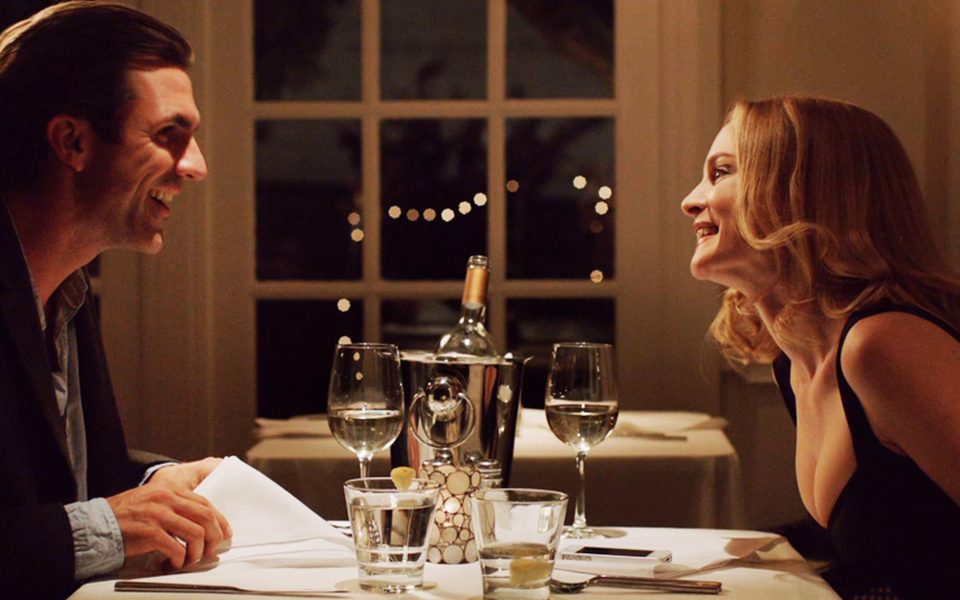by Sayaka Matsuoka
Angus MacLachlan is a hero in these parts.
He spent most of his life in Winston-Salem and attended UNC School of the Arts for both high school and college. He’s written scripts for movies with renowned actors, such as Stone with Robert DeNiro and Edward Norton, and ones set across the world such as the dark, Swedish drama, Förtroligheten.
The ties run deep, so it isn’t shocking that during a Jan. 10 screening of his new film, Goodbye to All That, at A/perture Cinema, his high school English teacher from UNCSA showed up.
During the Q&A session after the screening, she blushed with a mix of embarrassment and pride as MacLachlan pointed her out in the crowd.
Goodbye To All That, filmed and set in his hometown, is MacLachlan’s fourth as a screenwriter and his first as a director. It stars fellow UNCSA grad Paul Schneider, and recent screenings at A/perture have packed the house.
In the film, a clueless, middle-aged father and husband is suddenly thrown into the world of dating and casual sex after his wife divorces him, forcing him to balance his new situation with his old responsibilities that revolve around his 9-year-old daughter.
Otto Wall, played by Schneider, attempts to reconnect with past loves and scope out new ones. MacLachlan, who is still married, says he pulled from the experiences of close friends who have gone through the ups and downs of divorce and collated them to create one man’s adventure.
From the blonde, sex-crazed Christian to an old summer-camp flame, a bevy of women suddenly enter Otto’s misadventures of divorced life.
MacLachlan paid great attention to the timing of scenes to make them just long enough for the viewer to catch the essentials of the characters and story. The film is left with a staccato feel as it switches from scene to scene. MacLachlan said he prefers to see the beginning, middle and end of a film before putting pen to paper. Because of this, the film has a very thoughtful and meticulous feel, with deliberation in every moment.
“The focus is really just on Otto,” MacLachlan explained. His directing and writing throughout the film make that very apparent.
Schneider’s character is a klutz. He races through North Carolina woods on a four-wheeler and crashes out of sight. He ignores his broken foot and runs on it. He fails to notice a dildo, left by a woman he begins to see, in the backseat of the car with his daughter.
At one point, Edith asks her mom, “Why do these things always happen to daddy?”
“He doesn’t pay attention,” she dispiritedly replies.
He doesn’t even realize his wife has a therapist. And the moment the two of them blindside him to let him know his marriage is over, MacLachlan says, was drawn from the real-life experience of a friend.
The rest of the movie explores themes of identity, freedom and parenthood. The most important aspect of the film relies on Otto’s changing relationship with his daughter and his slow but steady self-discovery as a parent. As the film progresses, he begins to realize the flaws that ultimately led to the failing of his marriage.
MacLachlan said that it was wonderful to shoot a film locally, joking that it was especially enjoyable for his family who had to take care of him during his most grouchy and stressful moments of production. He had imagined from the beginning that the film would take place in Winston-Salem, even casting 39 alumni from UNCSA, including Schneider.
One audience member asked MacLachlan whether he knew he wanted to direct the movie as he wrote the script, to which he humbly replied that he didn’t. He likened directing to being a father, taking great care to make sure everyone involved felt appreciated and safe. This mentality directly contradicts the character of Otto in Goodbye To All That, making the underlying triumph of the movie MacLachlan’s own experiences as a father first and as the director second.
Join the First Amendment Society, a membership that goes directly to funding TCB‘s newsroom.
We believe that reporting can save the world.
The TCB First Amendment Society recognizes the vital role of a free, unfettered press with a bundling of local experiences designed to build community, and unique engagements with our newsroom that will help you understand, and shape, local journalism’s critical role in uplifting the people in our cities.
All revenue goes directly into the newsroom as reporters’ salaries and freelance commissions.


Loved this movie!!!